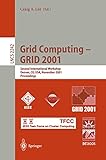Grid Computing - GRID 2001 [electronic resource] : Second International Workshop, Denver, CO, USA, November 12, 2001. Proceedings /
Material type: TextSeries: Lecture Notes in Computer Science ; 2242Publisher: Berlin, Heidelberg : Springer Berlin Heidelberg : Imprint: Springer, 2001Edition: 1st ed. 2001Description: XII, 188 p. online resourceContent type:
TextSeries: Lecture Notes in Computer Science ; 2242Publisher: Berlin, Heidelberg : Springer Berlin Heidelberg : Imprint: Springer, 2001Edition: 1st ed. 2001Description: XII, 188 p. online resourceContent type: - text
- computer
- online resource
- 9783540456445
- 004.2 23
- QA76.9.S88
Invited Presentation -- Grid Application Design Using Software Components and Web Services -- Object Middleware -- Design and Implementation of a CORBA Commodity Grid Kit -- Towards High Performance CORBA and MPI Middlewares for Grid Computing -- An Integrated Grid Environment for Component Applications -- Resource Discovery and Management -- KNOWLEDGE GRID: High Performance Knowledge Discovery Services on the Grid -- On Fully Decentralized Resource Discovery in Grid Environments -- An Adaptive Service Grid Architecture Using Dynamic Replica Management -- Identifying Dynamic Replication Strategies for a High-Performance Data Grid -- Scheduling -- Ensemble Scheduling: Resource Co-Allocation on the Computational Grid -- JobQueue: A Computational Grid-Wide Queuing System -- A Scheduling Model for Grid Computing Systems -- Grid Architecture and Policies -- Exposed versus Encapsulated Approaches to Grid Service Architecture -- A Methodology for Account Management in Grid Computing Environments -- Policy Engine: A Framework for Authorization, Accounting Policy Specification and Evaluation in Grids -- Performance and Practice -- Performance Contracts: Predicting and Monitoring Grid Application Behavior -- Production-Level Distributed Parametric Study Capabilities for the Grid -- The DO Experiment Data Grid—SAM.
The term "grid computing" is based on an analogy with the electrical power grid: computing capabilities should be ubiquitous and easy to use. While the development of what we now call grid computing is, in many ways, part of a natural progression of work done in the last decade, what's special about it is that all of its enabling technologies are converging at once: (1) a widely - ployed, network infrastructure will connect virtually every device in the world, (2) an interface technology is widely understood and embraced by virtually every segment of science, technology, commerce, and society, and (3) there is a wi- spread, and growing, understanding of the properties, capabilities, and services that are necessary and possible to utilize this infrastructure. Information services and resource brokers will allow the dynamic sharing of resources for applications large and small and enable virtual organizations. These properties, capabilities, and services will be used in different contexts to enable different styles of c- puting such as Internet computing and Peer-to-Peer computing. To facilitate the adoption of standard practices, the Global Grid Forum (www. gridforum. org) was formed to identify common requirements and push for eventual standardization. The phenomenal growth of grid computing and related topics has created the need for this workshop as a venue to present the latest research. This year's workshop builds on the success of last year's.


There are no comments on this title.